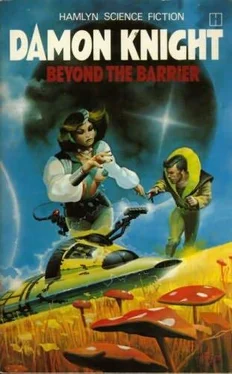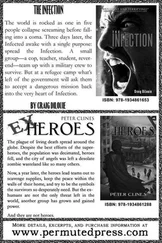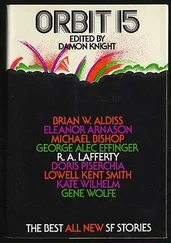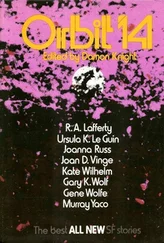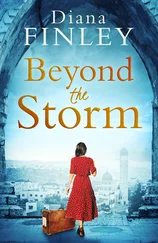Damon Knight - Beyond the Barrier
Здесь есть возможность читать онлайн «Damon Knight - Beyond the Barrier» весь текст электронной книги совершенно бесплатно (целиком полную версию без сокращений). В некоторых случаях можно слушать аудио, скачать через торрент в формате fb2 и присутствует краткое содержание. Год выпуска: 1964, Жанр: Фантастика и фэнтези, на английском языке. Описание произведения, (предисловие) а так же отзывы посетителей доступны на портале библиотеки ЛибКат.
- Название:Beyond the Barrier
- Автор:
- Жанр:
- Год:1964
- ISBN:нет данных
- Рейтинг книги:3 / 5. Голосов: 1
-
Избранное:Добавить в избранное
- Отзывы:
-
Ваша оценка:
- 60
- 1
- 2
- 3
- 4
- 5
Beyond the Barrier: краткое содержание, описание и аннотация
Предлагаем к чтению аннотацию, описание, краткое содержание или предисловие (зависит от того, что написал сам автор книги «Beyond the Barrier»). Если вы не нашли необходимую информацию о книге — напишите в комментариях, мы постараемся отыскать её.
Serialized originally in 3 parts: Dec. 1963, Jan. 1964, April 1964 editions of
Beyond the Barrier — читать онлайн бесплатно полную книгу (весь текст) целиком
Ниже представлен текст книги, разбитый по страницам. Система сохранения места последней прочитанной страницы, позволяет с удобством читать онлайн бесплатно книгу «Beyond the Barrier», без необходимости каждый раз заново искать на чём Вы остановились. Поставьте закладку, и сможете в любой момент перейти на страницу, на которой закончили чтение.
Интервал:
Закладка:
Now, in their circle of golden light, they were drifting along a spattered trail of bright-red pigment that began a few yards from the door. It looked as if paint had been dripped from a can along the shining floor, and then as if something else that Naismith could not quite understand had happened to it: the red pigment was crazed, checked, almost like weathered paint, and it was powdering away visibly, in streaks, toward the nearby wall.
Naismith bent to examine it as closely as he could through the shadow-egg. The only thing it suggested to him was a wind, drifting sand away from a dune: as if there were an impalpable slow wind here, drifting molecules of the red pigment across the floor….
He followed the red streaks to the wall, where, by squinting, he could make out a hairline of bright red along the join between wall and floor, running out of sight in either direction.
Did the floor reject anything that did not belong there? Were dust, dirt, and red pigment swept away automatically and disposed of?
He straightened. The wall itself was of the same metallic marble as the floor—marble, if such a thing were possible, with flecks and veins of gold diffused uniformly through it. A few feet farther on there was an elaborate metal frame on the wall, and Naismith’s interest quickened: but the frame was empty.
They floated through an archway, into a chamber only less gigantic than the first. Divans and tables stood here and there, in little, widely separated groups. Rich, soft rugs covered the floor; the red trail had been dripped indiscriminately over them, but here, too, the pigment was drifting away in long, faint streaks.
Some of the furniture looked like parodies of the over-stuffed sofas and armchairs of his own time—puffed, bulging things, looking inflated rather than upholstered, and apparently made all in one unit—no separate cushions, no legs underneath.
Other pieces were built on a different principle: these were suspended, like porch gliders, from metal frameworks which rose to cylinders at either end. Between these cylinders swung chairs and sofas which appeared neither stuffed nor inflated, but were as if poured from some taffy-like substance, in silky bright colors and with a curious, eye-deceiving mistiness of surface. They were like shapes of bright smoke poured out of the cylinders at either end; and Naismith had the fanciful thought that if one turned off the mechanism in those cylinders, the chair or sofa would dissolve into vapour.
The red trail led them down a corridor lined with more of the empty metal frames; then through another archway, up a stair and around a gallery, over an empty chamber still larger than anything Naismith had seen; up another stair, down a hall, through another doorway.
The room they now entered was a small lounge from which other doorways opened on all sides. Naismith’s first impression was of a fully illuminated room, more cluttered and disorderly than anything he had seen until now. Then his attention came to a sharp, incredulous focus: across the room, he saw the shadow-egg plainly reflected in a mirror… but his own image was not there.
He blinked and looked again. There was no mistake; only the reflections of Lall and Churan stared back at him… there was something wrong about them, too, in the way they were dressed, or—
Then the vision faded, became transparent and was gone.
There was no mirror. He realized abruptly that the image had not been reversed; his mind had supplied the mirror, an effort to make an intelligible pattern out of what he saw. But what had he seen?…
Beside him, Churan laughed—a hoarse, nervous bark. “Don’t worry, Mr. Naismith,” he said.
Naismith turned. Both aliens were glancing at him with malicious smiles, but their attention seemed elsewhere. Churan made a final adjustment on the polished surface of the machine as the shadow-egg touched the carpet: then, leaning upon the machine with one hand as if it were a tabletop, he got his legs out from under it and stood up. Over the stool on which he had been sitting, the machine hung in air, unsupported and im-movable.
Churan exchanged a few words with Lall; both looked serious and intent. Bending over the machine, Churan did something to it that Naismith could not follow: and the shadow-egg burst like a soap-bubble.
They were standing in the middle of the brilliantly lighted room, all three; Churan tucked the machine under his arm like a briefcase.
There was movement in one of the doorways, and a small creature walked out into view. Naismith had to look twice to see that it was a child.
Lall bent over the creature, smoothing its dull black hair mechanically with one hand. The child spoke to her in a high, thin whine; she answered perfunctorily and pushed it away.
With an incurious glance at Naismith, the child stumped off on its thick legs, sat down and began to play with a rag doll.
It was a quite incredibly ugly creature, greenish-brown-skinned, with sullen features. It looked like a caricature of Lall or Churan, everything about it coarsened and exaggerated.
“Is this your child?” Naismith asked, turning to Lall.
She nodded. “It is a female—her name is Yegga.” She added a sharp sentence to the child, which was picking its nose; it left off and screamed once at its mother, without changing its sullen expression, then bent over its doll once more.
Naismith glanced around the room. Clothing was strewn over chairs and carpet; there were crumpled papers, even bits of food dropped here and there.
The high walls were paneled in vivid magenta and ivory: the ivory, Naismith discovered, was the wall itself, a dull, texture-less surface; the wide magenta strips were hangings of the same substance as the suspended furniture, and had the same smoky outlines. Some of the chairs were of the same bright magenta; others were electric blue or ivory; the deep-piled carpet was apple green. The clothes piled carelessly here and there were of all hues.
“You left her here when you went back to my time?” Naismith asked, indicating the child.
Lall nodded again. “She would have interfered with our work.”
‘What if something had happened, and you’d never come back?”
“But we knew we would come back, Mr. Naismith,” said Churan, stepping nearer. “We saw ourselves arrive, just as we saw ourselves leave just now… remember?”
A tingling sensation went down Naismith’s spine as, with a renewed shock, he thought of the vision he had seen. If Churan were telling the truth, for an instant, just then, time had been doubled back on itself.
Naismith sat down on one of the armchairs, watching Churan as he stepped to the wall, opened a panel, and thrust the machine inside. Lall was stretching herself, looking relieved but abstracted, like any housewife returning after an absence.
“Let me understand this,” Naismith said vehemently. “You knew that your mission would be successful, then—because you saw yourselves coming back with me, before you left?”
“Yes. We knew.” Churan began unfastening his jacket and shirt, pulling them off. He threw them on the nearest sofa with a grunt of relief. His hairless chest from the neck down, and his arms as far as the elbow, were a brownish-green color, the green of algae; it was apparently the natural color of his skin.
“Sit down, Mr. Naismith,” said Lall, taking off her blouse.
“Dial for some food, Gunda.” Her body, the same brownish-green as Churan’s, was squat and soft-looking; the proportions were not quite human. Their bodies were mammalian, but entirely hairless, and, compared with a human being of Naismith’s time, hardly sexed at all. Lall’s breasts were almost as small and flat as Churan’s.
The child glanced up from its play, then bent over again. It was, Naismith saw with a shock of distaste, pushing long pins or wedges of metal into the soft body of the doll.
Читать дальшеИнтервал:
Закладка:
Похожие книги на «Beyond the Barrier»
Представляем Вашему вниманию похожие книги на «Beyond the Barrier» списком для выбора. Мы отобрали схожую по названию и смыслу литературу в надежде предоставить читателям больше вариантов отыскать новые, интересные, ещё непрочитанные произведения.
Обсуждение, отзывы о книге «Beyond the Barrier» и просто собственные мнения читателей. Оставьте ваши комментарии, напишите, что Вы думаете о произведении, его смысле или главных героях. Укажите что конкретно понравилось, а что нет, и почему Вы так считаете.
